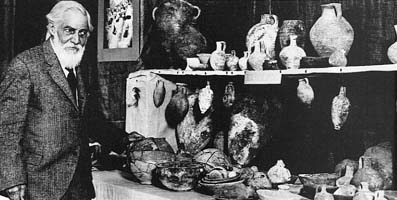Image Details

Corbis
William Flinders Petrie (1853–1942) pioneered the field of scientific archaeology in the Near East. At 27, he began the first accurate survey of the pyramids of Giza; at 30, he excavated sites in the Nile Delta. His excavation technique was based on the concept that ancient remains lie in strata and that pottery, whose style evolves over time, could be used to date the strata in which it was found. Of particular note was his work at el-Amarna, where he discovered portions of Pharaoh Akhenaten’s palace and the el-Amarna tablets, which chronicled dealings between Akhenaten and foreign monarchs. In 1890 he turned his spade to Palestine. His excavation of Tell el-Hesi was the first scientific excavation in the Holy Land. He later excavated Tell Jemmeh, Tell el-‘Ajjul and Tell el-Far‘ah South. His archaeological achievements led to his being knighted in 1923.
